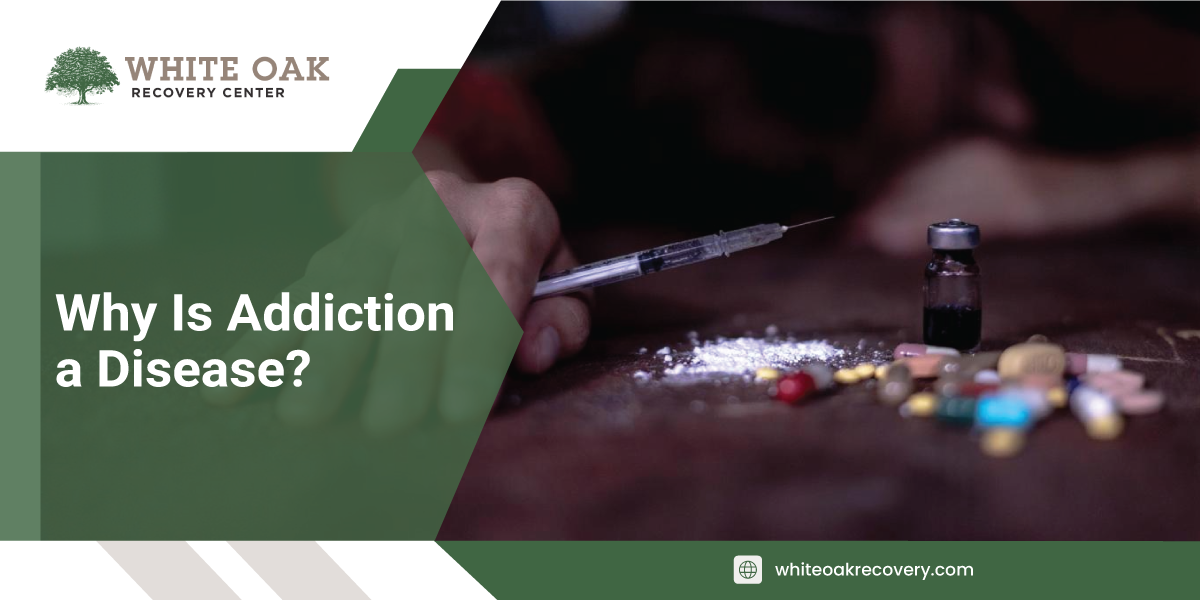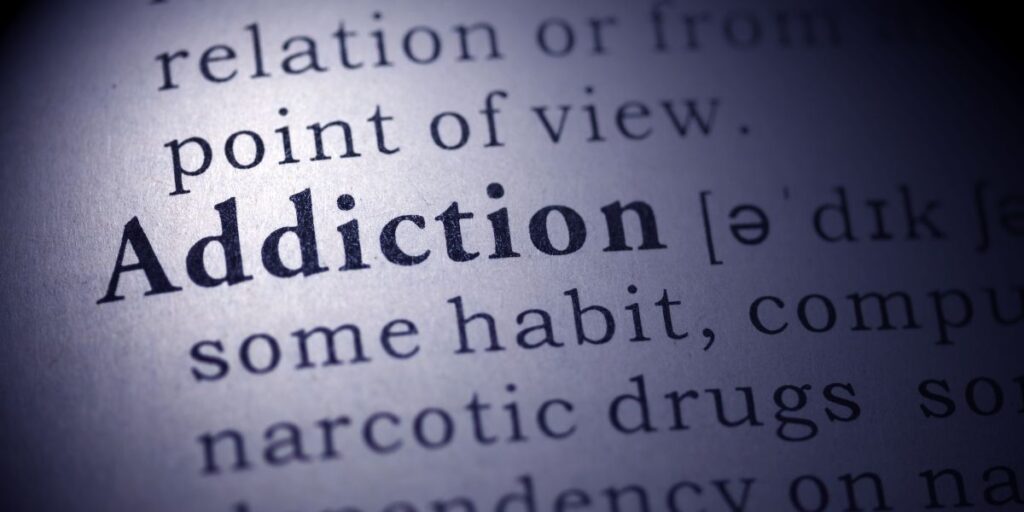Why Is Addiction a Disease?


Medical Writer:
Reviewer:

Johnny Kim
Executive Psychotherapist
Medical Writer:
Reviewer:

Johnny Kim
Executive Psychotherapist
The American Medical Association (AMA) officially acknowledged addiction as a disease in the year 1987. Despite this, not everyone agrees with this classification. Some people believe addiction is a moral issue or a lack of willpower and ethics. They do not see it as a medical condition.
Table of Contents
Toggle
Addiction Defined
Drug and alcohol addiction is called a substance use disorder, and it involves the chronic use of substances despite adverse consequences and long-term health changes. Addiction is characterized by three or more of the following criteria within 12 months:
- Use of the substance in larger amounts or for a longer duration than intended
- Persistent desire or unsuccessful attempts to control or reduce use
- Continued use despite awareness of a persistent physical or mental health issue exacerbated by substance use
- The presence of a distinctive withdrawal syndrome for the substance
- Lessening or stopping going to social, occupational, or recreational activities because of drug or alcohol use
- Noticeably diminished effect with continued use of the same amount
- A need for significantly increased amounts to achieve intoxication or desired effects
- Consumption of the substance to relieve or avoid withdrawal symptoms
- Considerable time spent obtaining, using, or recovering from the substance

Signs of Drug Addiction
Signs of alcohol or drug addiction include:
- Significant weight loss or gain
- Long sleeves and tinted glasses in inappropriate settings
- Severe mood swings or changes in personality
- Dilated or pinpoint pupils
- Withdrawal from family, friends, coworkers
- Relationship issues: friends, family, marital, professional
- Refusing social invitations
- Poorly explained injuries and accidents
Is Addiction a Choice?
Some people, like Gene Heyman, author of “Addiction: A Disorder of Choice,” argue that addiction should be viewed more as a choice than a disease. According to his perspective, treating addiction as a choice can lead to more effective management strategies. His model highlights the importance of self-control and encourages the adoption of positive behaviors to combat addictive habits.
Particularly noteworthy is Gene Heyman’s mention of two federal research organizations focused solely on addiction: the National Institute on Drug Abuse (NIDA) and the National Institute on Alcoholism and Alcohol Abuse (NIAAA). He says people view addiction as a disease. Researchers have spent a lot of time and resources studying it. However, the number of people with drug addiction has not decreased.
If addiction is viewed solely as a choice, it could discourage the need for medical research on addiction. This could also result in a preference for punishment over addiction treatment. This perspective may undermine efforts to understand and treat addiction as a complex medical condition.
The initial decision to consume alcohol or use drugs is usually a choice. However, this does not imply that one chooses to become addicted.
Addiction is far more complex. Continued use of alcohol or drugs can severely impair a person’s self-control. When someone becomes addicted, they are deeply affected by the disease, which changes their way of thinking.
The Addicted Brain
In neuroscience, “reward” means things that make the brain feel good, like pleasure, happiness, or relief from pain. Addiction affects the brain’s reward system, which feels pleasure.
It becomes hard to resist harmful behaviors. This can make the brain focus more on addictive behaviors, sometimes ignoring the person’s well-being.
Alcoholism and drug addiction are processed similarly by the brain. Once addiction develops, it hijacks the brain’s reward pathway, which is crucial for essential behaviors like eating and sleeping. This takeover causes the brain to realign its priorities, focusing predominantly on seeking pleasure.
Over time, your brain gets used to the substance for pleasure, making it more important than natural rewards like sex and eating. The brain actively pursues this pleasure, which causes the receptors that typically regulate rewards to become desensitized. This numbing makes you want more of the addictive substance, so you need more to feel the same effects. This can lead to withdrawal symptoms later.
The Risk of Addiction
Genetic predispositions and early developmental experiences shape the risk of developing an addiction. Childhood trauma, such as abuse or having an alcoholic parent, is not the sole cause of the disorder. It is not enough to blame these factors only for the disorder’s development. Other factors may also contribute to the disorder’s development.
Social pressures and psychological factors can cause addiction. Social pressures include peer influence, societal norms, and family relationships. Psychological factors can consist of past abuse, trauma, or other mental health issues. Dual diagnosis treatment is necessary when a person has both a substance use disorder and another mental health disorder at the same time.
This concept is significant in healthcare. It involves conditions such as anxiety or post-traumatic stress disorder (PTSD). This is an important concept in healthcare.

Why Addiction Is a Disease
When someone keeps using a substance, they need more and more of it to feel the same effects. This is how addiction typically develops. People stuck in this cycle focus a lot on getting and using the substance, feeling rewarded every time they use it. As time goes on, they become less interested in other activities that could bring them happiness.
Denial is a powerful factor that perpetuates the cycle of addiction. It is deeply intertwined with addiction, thriving on its ability to erode free choice and self-control. People often deny their addiction because they feel good when using the substance and lose interest in other activities. As a result, the addicted brain is like a locked safe, where the addictive substance is the only key to unlock it.
Addiction Treatment at White Oak Recovery Center
Addiction is a complex condition recognized as a disorder, a brain disease, and a behavioral health issue. It is important to understand that addiction is not a choice. With appropriate treatment, however, it can be managed effectively and remain in remission. At White Oak Recovery Center (WORC), we provide evidence-based, multi-disciplinary care to effectively treat your substance use disorder and co-occurring mental health condition.
Research has shown that residential treatment programs that address co-occurring disorders, such as dual diagnosis treatment and incorporate medication-assisted treatment (MAT) led by addiction medicine experts, are the most effective ways to support people struggling with substance use disorders. WORC provides both treatments and incorporates them into therapies included in your personalized treatment plan.
These methods increase the likelihood of successful recovery by treating substance abuse and mental health issues simultaneously. By addressing both issues together, we improve the chances of recovery.
The journey to recovery is a commitment to personal development and an opportunity for healing. At White Oak Recovery Center, we aim to build a foundation of well-being that supports lasting sobriety.
Addictions of all types are treatable and should not be a source of shame. WORC proudly provides a luxury residential treatment program with compassionate expertise and care to help you live a happy life rooted in recovery.
Please don’t hesitate to contact us to learn how we can customize your recovery plan. We are here to support you.

Am I covered for addiction treatment?
Your insurance may cover treatment. Call now for an entirely free and confidential assessment. Recovery starts with a phone call.

- Justinova, Zuzana, et al., “Drug Addiction.” Curr Top Behav Neurosci., Feb. 2011.
- Branch, Marc N., “Drug Addiction. Is it a Disease, or is it Based on Choice? A Review of Gene Heyman’s Addiction: A Disorder of Choice.” Journal of the Experimental Analysis of Behavior, Mar. 2011.
- “Biology of Addiction.” U.S. Department of Health and Human Services, Oct. 2015.
Medical Disclaimer:







